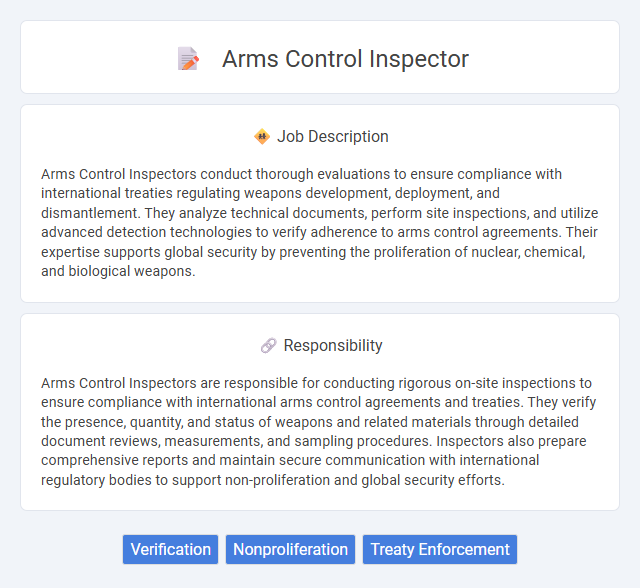
Arms Control Inspectors conduct thorough evaluations to ensure compliance with international treaties regulating weapons development, deployment, and dismantlement. They analyze technical documents, perform site inspections, and utilize advanced detection technologies to verify adherence to arms control agreements. Their expertise supports global security by preventing the proliferation of nuclear, chemical, and biological weapons.
Individuals with strong analytical skills and attention to detail are likely to be suitable for an Arms Control Inspector role due to the rigorous examination and compliance verification involved. People who are comfortable working under pressure and possess a high level of integrity may have a higher probability of success in managing sensitive and classified information. Those who prefer physically demanding or highly social jobs might find the conditions challenging, as the role often requires meticulous documentation and adherence to strict protocols.
Qualification
Arms Control Inspectors require a background in international relations, political science, or security studies, often complemented by an advanced degree in these fields. Proficiency in treaty verification protocols, nuclear nonproliferation measures, and chemical weapons conventions is essential, alongside skills in data analysis and field inspection techniques. Strong communication abilities and security clearance are mandatory to effectively conduct inspections, compile reports, and liaise with government and international organizations.
Responsibility
Arms Control Inspectors are responsible for conducting rigorous on-site inspections to ensure compliance with international arms control agreements and treaties. They verify the presence, quantity, and status of weapons and related materials through detailed document reviews, measurements, and sampling procedures. Inspectors also prepare comprehensive reports and maintain secure communication with international regulatory bodies to support non-proliferation and global security efforts.
Benefit
An Arms Control Inspector position likely offers the benefit of contributing to international security by verifying compliance with arms reduction agreements, which may provide a strong sense of purpose and job satisfaction. The role probably involves access to advanced training and technical expertise, enhancing professional development opportunities. Competitive government salaries and benefits packages are also expected, potentially including health insurance, retirement plans, and opportunities for career advancement.
Challenge
Arms Control Inspectors likely face the challenge of accurately verifying compliance with international treaties while navigating complex diplomatic and political landscapes. The role probably demands meticulous attention to detail and a strong understanding of technical specifications and regulations. Inspectors may encounter resistance or limited cooperation, making effective communication and problem-solving skills essential for successful mission outcomes.
Career Advancement
Arms Control Inspectors specialize in verifying compliance with international treaties and agreements related to weapons regulations, making expertise in nuclear, chemical, and biological weapons essential for career growth. Advancing in this field often requires obtaining security clearances, rigorous technical training, and gaining experience in international diplomacy and intelligence analysis. Leadership roles and specialized positions in government agencies or international organizations become accessible through proven skills in negotiation, legal frameworks, and advanced inspection technologies.
Key Terms
Verification
Arms Control Inspectors play a critical role in the verification of international treaties by conducting on-site inspections and monitoring compliance with arms control agreements. Their expertise includes analyzing weapons systems, assessing facilities, and employing advanced verification technologies such as satellite imagery and surveillance equipment. Effective verification ensures transparency, deters proliferation, and supports global security frameworks by confirming that parties adhere to agreed disarmament measures.
Nonproliferation
Arms Control Inspectors specializing in nonproliferation enforce international treaties aimed at reducing the spread of nuclear, chemical, and biological weapons by conducting thorough inspections of facilities and materials. They analyze compliance with agreements such as the Treaty on the Non-Proliferation of Nuclear Weapons (NPT) and employ advanced detection technologies to identify illicit weapon development. Expertise in international law, verification protocols, and technical assessments is essential to support global security and prevent the proliferation of weapons of mass destruction.
Treaty Enforcement
Arms Control Inspectors play a critical role in treaty enforcement by verifying compliance with international arms control agreements through on-site inspections, data analysis, and monitoring of weapon production and storage facilities. They utilize specialized detection technologies and conduct thorough evaluations to ensure transparency and prevent illicit proliferation of weapons of mass destruction. Their work supports global security efforts by identifying violations and facilitating diplomatic resolutions.
 kuljobs.com
kuljobs.com